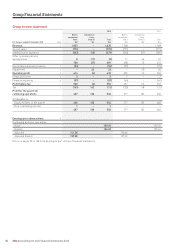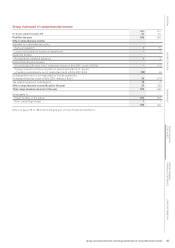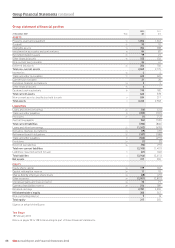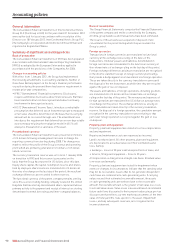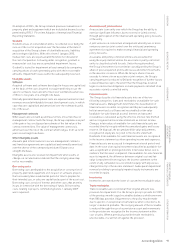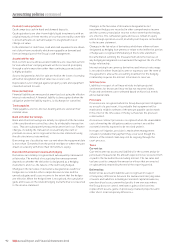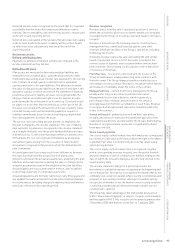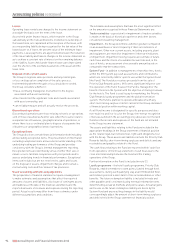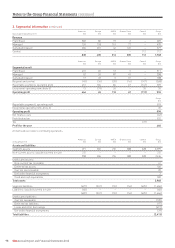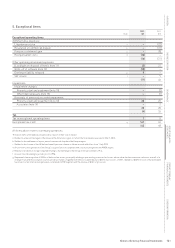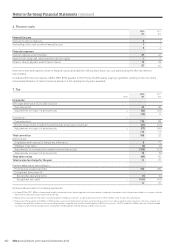Holiday Inn 2012 Annual Report Download - page 96
Download and view the complete annual report
Please find page 96 of the 2012 Holiday Inn annual report below. You can navigate through the pages in the report by either clicking on the pages listed below, or by using the keyword search tool below to find specific information within the annual report.
94 IHG Annual Report and Financial Statements 2012
Leases
Operating lease rentals are charged to the income statement on
a straight-line basis over the term of the lease.
Assets held under finance leases, which transfer to the Group
substantially all the risks and benefits incidental to ownership of
the leased item, are capitalised at the inception of the lease, with
a corresponding liability being recognised for the fair value of the
leased asset or, if lower, the present value of the minimum lease
payments. Lease payments are apportioned between the reduction
of the lease liability and finance charges in the income statement so
as to achieve a constant rate of interest on the remaining balance
of the liability. Assets held under finance leases are depreciated
over the shorter of the estimated useful life of the asset and the
lease term.
Disposal of non-current assets
The Group recognises sales proceeds and any related gain
or loss on disposal on completion of the sales process.
In determining whether the gain or loss should be recorded,
the Group considers whether it:
• has a continuing managerial involvement to the degree
associated with asset ownership;
• has transferred the significant risks and rewards associated
with asset ownership; and
• can reliably measure and will actually receive the proceeds.
Discontinued operations
Discontinued operations are those relating to hotels or operations
sold or those classified as held for sale when the results relate to
a separate line of business, geographical area of operations, or
where there is a co-ordinated plan to dispose of a separate line
of business or geographical area of operations.
Exceptional items
The Group discloses certain financial information both including
and excluding exceptional items. The presentation of information
excluding exceptional items allows a better understanding of the
underlying trading performance of the Group and provides
consistency with the Group’s internal management reporting.
Exceptional items are identified by virtue of either their size or
nature so as to facilitate comparison with prior periods and to
assess underlying trends in financial performance. Exceptional
items can include, but are not restricted to, gains and losses
on the disposal of assets, impairment charges and reversals,
restructuring costs and the release of tax provisions.
Use of accounting estimates and judgements
The preparation of financial statements requires management
to make estimates and assumptions that affect the reported
amounts of assets and liabilities, disclosure of contingent assets
and liabilities at the date of the financial statements and the
reported amounts of revenues and expenses during the reporting
period. Actual results may differ from these estimates under
different assumptions and conditions.
The estimates and assumptions that have the most significant effect
on the amounts recognised in these Financial Statements are:
Trade receivables – a provision for impairment of trade receivables
is made on the basis of historical experience and other factors
considered relevant by management.
Impairment – the Group determines whether goodwill is impaired
on an annual basis or more frequently if there are indicators of
impairment. Other non-current assets, including property, plant
and equipment, are tested for impairment if there are indicators
of impairment. Impairment testing requires an estimate of future
cash flows and the choice of a suitable discount rate and, in the
case of hotels, an assessment of recoverable amount based on
comparable market transactions.
System Fund – in addition to management or franchise fees, hotels
within the IHG System pay cash assessments and contributions
which are collected by IHG for specific use within the System Fund
(the Fund). The Fund also receives proceeds from the sale of
Priority Club Rewards points. IHG exerts significant influence over
the operation of the Fund, however the Fund is managed for the
benefit of hotels in the System with the objective of driving revenues
for the hotels. The Fund is used to pay for marketing, the Priority
Club Rewards loyalty programme and the global reservation
system. The Fund is planned to operate at breakeven with any
short-term timing surplus or deficit carried in the Group statement
of financial position within working capital.
As all Fund income is designated for specific purposes and does
not result in a profit or loss for the Group, the revenue recognition
criteria as outlined in the accounting policy above are not met and
therefore the income and expenses of the Fund are not included
in the Group income statement.
The assets and liabilities relating to the Fund are included in the
appropriate headings in the Group statement of financial position
as the related legal, but not beneficial, rights and obligations rest
with the Group. These assets and liabilities include the Priority Club
Rewards liability, short-term timing surpluses and deficits and any
receivables and payables related to the Fund.
The cash flows relating to the Fund are reported within ‘cash flow
from operations’ in the Group statement of cash flows due to the
close interrelationship between the Fund and the trading
operations of the Group.
Further information on the Fund is included in note 33.
Loyalty programme – the hotel loyalty programme, Priority Club
Rewards, enables members to earn points, funded through hotel
assessments, during each qualifying stay at an IHG branded hotel
and redeem points at a later date for free accommodation or other
benefits. The future redemption liability is included in trade and
other payables and is estimated using eventual redemption rates
determined by actuarial methods and points values. Actuarial gains
and losses on the future redemption liability are borne by the
System Fund and any resulting changes in the liability would
correspondingly adjust the amount of short-term timing surpluses
and deficits held in the Group statement of financial position.
Accounting policies continued


